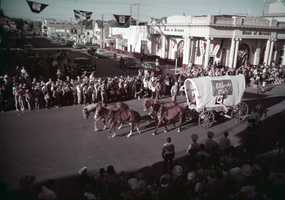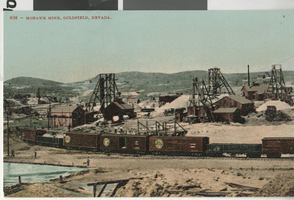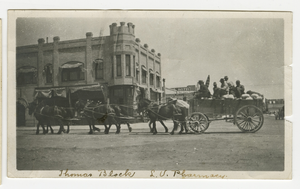Search the Special Collections and Archives Portal
Search Results
Jerri Mausbach oral history interview
Identifier
Abstract
Oral history interview with Jerri Mausbach conducted by Jim Cox on October 02, 2007 for the Public School Principalship Oral History Project. In this interview, Mausbach reflects upon his experience as a teacher and administrator with Nevada’s Clark County School District (CCSD). He describes the process by which he became a teacher and eventually administrator, his experiences working with special education, and elements of his training that he believes were most useful for his career. He also discusses his approach to school administration and administrative issues that he has dealt with as the Director of Leadership Development.
Archival Collection
Mary Wesley oral history interview
Identifier
Abstract
Oral history interview with Mary Wesley conducted by Claytee D. White on October 22, 2007 for the UNLV University Libraries Oral History Collection. In this interview, Wesley discusses her early life in Quitman, Mississippi. She recalls the racism she experienced during her youth, the church community in Quitman, and traveling to Las Vegas, Nevada by train. She talks about the welfare rights movement in Las Vegas, Operation Life, and businesses on Jackson Street. Lastly, Wesley describes the entertainment on the Westside, and integration on the Las Vegas Strip.
Archival Collection
Isabella Jessie Curtis oral history interview
Identifier
Abstract
Oral history interview with Isabella Jessie Curtis conducted by Andrew B. Levy on February 15, 1979 for the Ralph Roske Oral History Project on Early Las Vegas. Curtis first talks about her career in waitressing at several restaurants and casinos in Las Vegas, Nevada. She also discusses her involvement in politics, her early recreational activities, and the atomic testing. Curtis then describes living in Sandy Valley, Nevada, and some of her first memories of the Union Pacific train depot in Las Vegas.
Archival Collection
Jay and Jayson Dicotignano oral history interview
Identifier
Abstract
Oral history interview with Jay and Jayson Dicotignano conducted by Dennis McBride on November 05, 2006 for the Las Vegas Gay, Lesbian, Bisexual and Transgender Archives Oral History Project. In this interview, the Dicotignanos talk about their marriage and the Men’s Movement of the late 1980s. Jay discusses his career as a therapist, in public health, and the process to have a gay marriage ceremony at a church. Later, the two describe gay parenthood and what gay couples did to have children. Lastly, they recall foster parent training and becoming foster parents.
Archival Collection
Clay Lynch oral history interview
Identifier
Abstract
Oral history interview with Clay Lynch conducted by Linda M. Trust on June 28, 1973 for the Ralph Roske Oral History Project on Early Las Vegas. In the interview, Lynch discusses moving to Las Vegas, Nevada from Illinois in July 1955, his education at the University of Pittsburgh, Nevada social welfare programs, and Las Vegas, Nevada casino showrooms. Lynch also briefly discusses his work as a United States Army engineer training officer, as well as a transportation engineering consultant and contractor for his company, Lynch Brothers.
Archival Collection

Transcript of interview with Thelma Coblentz by Judith Chavez, February 17, 1980
Date
Archival Collection
Description
On February 17, 1980, Judith Chavez interviewed Thelma Coblentz (born 1911 in New Jersey) about her experiences in Southern Nevada. Coblentz first talks about her move to Lovelock, Nevada, where her husband provided medical care as one of the first physicians in the small town. She later talks about her move to Las Vegas and some of the services she helped to provide at Nellis Air Force Base. Coblentz later describes Downtown Las Vegas, specifically the development of the casinos and shopping businesses. She later talks about the rainstorms and dust storms that the city would experience before recalling some of the entertainers who would perform on the Las Vegas Strip. The interview concludes with a discussion on the first physicians in Las Vegas and the increasing population of the city.
Text

Film transparency showing Helldorado parade in Las Vegas, circa 1940s-1950s
Date
Archival Collection
Description
Image

Postcard of Mohawk Mine, Goldfield (Nev.), 1905
Date
Archival Collection
Description
Image

Photograph of the First load of manganese from 3 Kids Mine as it arrives in town, Las Vegas (Nev.), 1900-1925
Archival Collection
Description
Image

Photograph of William Andrews Clark and party on a private railroad car, 1900-1925
Date
Archival Collection
Description
Image
